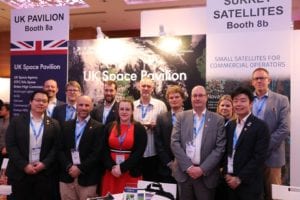
By Anna Hazlett
This was my second time attending the Global Space and Technology Convention (GSTC) in Singapore, held 5-7 February 2020. GSTC is just one example of the Singapore Space and Technology Association’s (SSTA) ongoing efforts to bolster Asia’s space & technology scene.
The SSTA focuses on developing Singapore’s space and related high technology industries. Active in the space industry, SSTA spearheads major trade and business-focused initiatives targeted at advancing the space ecosystem.
There’s no doubt SSTA brings together consumers, as evidenced by this year’s GSTC participants, which included space research organisations, leading and emerging technology companies, venture capitalists (few – but a steadily growing number), and space agencies from around the world. Of particular note, this year saw newcomers from governments, including the UAE Space Agency and the Hungarian Ministerial Commissioner for Space Research.
We heard from industry experts over a very engaging two-day agenda. Among the exceptional presentations were those from Vivian Quenet, Managing Director & Head of Sales for Asia-Pacific for Arianespace, on “Facts, Figures, and Trends of Commercial Space”; “3D Printing in Space” with Dr Ho Chaw Sing, Managing Director for Namic; and “The UAE’s Space Programme” presented by Talal Al Kaissi, Advisor, Strategic Projects, for the UAE Space Agency. These presenters stood out as they gave personal views, explained the drivers behind their respective activities, and pointed to exciting future prospects in commercial space.
The panel featuring Christian Patouraux, CEO & Founder, Kacific, and Zee Zheng, CEO & Co-founder, SpaceChain, demonstrated how new players are challenging the incumbents and changing the satellite industry with novel technologies to provide important value to users.
The “Successful Universities Programmes in Smallsat Innovation” panel, saw Amal Chandran, Director, Satellite Research Centre, Nanyang Technological University, give the audience useful insights on working closely with universities for research and development purposes and utilizing talent and resources at hand. Yasunori Yamazaki, Chief Business Officer, Axelspace, revealed the catalytic support received from a university venture-fund arm in the beginning of Axelspace’s journey, which certainly got the audience thinking about alternative funding sources. The other panelists continued to build the case around the nexus between industry and higher education. It’s no wonder then that the Chairman of the UAE Space Agency is also the Minister of State for High Education and Advanced Skills.
Admittedly, despite the growing technological progress observed in the past decades, one thing we hear far less about across the space sector is the measurable impact companies, founders, and the industry at large have on the United Nations’ Sustainable Development Goals and the related application of technologies. Victoria Alonsoperez, Founder & Inventor, Chipsafer, and a United Nations Young Leader for the Sustainable Development Goals, was a considerable presence at the conference, holding the mantle and keeping her industry peers mindful and accountable to sustainable practices, while demanding both the sustainability of our space ecosystem and that we all contribute to #Space4SDGs!
We will see a number of significant industry events leading up to the next GSTC in 2021, notably the International Astronautical Congress, IAC 2020, in Dubai, 12-16 October 2020, making the UAE the first Arab country to host this annual, high profile gathering of the international space industry.
The theme of IAC2020 is Inspire, Innovate & Discover for the Benefit of Humankind. This theme should spur us to encourage non-space-sector actors and adjacent industry players to attend, connect, and contribute to the conversation.
Surely a broader, more vibrant audience from ‘outside’ the space industry—as well as the usual suspects—will help facilitate effective discussions, build successful partnerships, and expand capabilities for the betterment of the space ecosystem and its wider impact on humankind.

Anna Hazlett is the Middle East – Asia Representative for SpaceWatch.Global.





